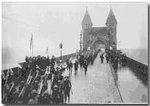Before it gets too political, why not turn the table around....? How different would Europe and the world be today if WWII hadn't happened, if Hitler had stopped with Austria and Czechoslovakia? Just curious for some interesting answers...
It is a good question, Lucky.
I'm not sure Hitler could stop in 1938. He was broke (rebuilding the Wermacht/Luftwaffe/Kriegmarine is expensive) which accounts for some of the impetus of his actions. However, the question is a good one.
I think National Socialism goes the way of Marxist Socialism and dies in a generation after Hitler's death. If you look at the Totalitarian Socialist regimes that were started around that time, both Right Wing and Left Wing, you see they have a life span of (generally) 20-70 years (without being destroyed by war). That leaves a lot of leeway but most socialist regimes (Spain, Yugoslavia, Cambodia, Germany, Italy, Cuba?) don't outlive their creators. In the cases where they do (Russia, China) they either tend to morph into something more effective economically or get caught in a spiral of collapse.
Don't count the East Block nations as they were more buffer states for the Soviet Union than actual working Socialist entities.
So. my guess is Hitler dies in the Late 50s/Early 60s and the next ten years for Germany is a continuing struggle for power against various forces ending up in a general govt collapse. The alternative idea is Germany goes to war with France or Poland shortly before the collapse to divert citizenry from problems, much like Argentina did in the 80s with the Falklands.
Italy? Mussolini tanks it some time around 1945. No particular reason, just the general inefficiency of his realm and the oddball adventures he gets Italy into ground the country down and the Italians dump him.
Soviet Union is the real question. What is Stalin going to do. He was on a run of expansion up until 1941. Doubt he would stop. The possibility exists that the Soviet Union goes to war against Germany. To do that, the SU is going to have to attack Poland. That is a possibility. They had a pretty brutal war in the 20s, might start up again as Stalin moves West.

